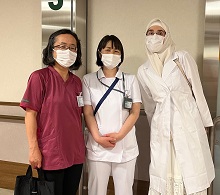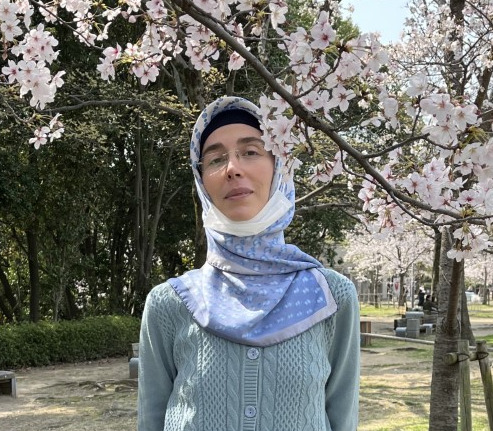International Disaster Nursing
Ms. Perihan has completed her one-year post-doctoral research term and has returned home.
Ms. Perihan has completed her one-year post-doctoral research term and has returned home. We wish her the best of luck in her future endeavors.

We have a researcher from Türkiye.

In the early morning hours of February 6, 2023, a strong earthquake struck a large area of southeastern Türkiye and northern Syria. Many people in Türkiye and Syria lost their lives and the situation is still severe. We pray for the souls of those who lost their lives and express our sympathy to the victims.
Currently, Dr. Perihan, a researcher from Türkiye, is studying disaster nursing in Japan at the Graduate School of Biomedical and Health Sciences (International Disaster Nursing), Hiroshima University. She spoke to us about Disaster Risk Reduction in Türkiye, disaster nursing, and her impressions of Japan.
Q. Dr. Perihan, please begin with a brief self-introduction.
My name is Perihan Şimşek, I graduated from Karadeniz Technical University Nursing PhD program in 2019. I have just three years of emergency nursing experience. I’ve been working at Emergency Aid and Disaster Management Department of Trabzon University/Türkiye for three years, specifically focusing on disaster nursing for rising global need for nursing care in disaster. I am working at Hiroshima University as a postdoctoral researcher in an international project with the support of Türkiye’s biggest Scientific Research Council (TUBITAK).。
Q: Why did you choose to come to Hiroshima to study disaster nursing?
It is well known in Türkiye that the disaster management system in Japan is very strong and field of disaster nursing is well improved. For this reason, I wanted to study in Japan to improve myself in these fields. Then I read the publications of Kako Sensei and I was very impressed. I followed her studies in the field of disaster nursing. I wanted to take part in these studies with her. I met with her and she accepted me to Hiroshima University as a postdoctoral student. I am truly grateful to her for this opportunity.
Q: It has been about 8 months since you came to Japan last July. What have you been researching and learning about Disaster Risk Reduction and Disaster Nursing since you came to Japan?
I have mainly worked on improving the disaster resilience of public health systems. Under the guidance of Kako Sensei, I worked on the role of primary care providers in improving the resilience of vulnerable populations to disasters. In the first few months after my arrival, I had the opportunity to participate in the eSTART course. During this course, I learned essential information about disaster risk reduction and gained very important information about the roles and responsibilities of disaster nurses. I also had the opportunity to research and learn about the role of the community in disasters and the services that volunteers can provide.
Q: What are the major differences between the Turkish and Japanese healthcare systems?
Healthcare services for the elderly are more developed in Japan than in Türkiye. In Türkiye, the elderly are usually cared for by family members, and there are no different types of specialized care facilities in the healthcare system, as there are in Japan.
In addition, the insurance system in Japan requires individuals to pay monthly premiums based on their age and profession. Türkiye has a general health insurance system. Regardless of economic status, all citizens have the access to receive the same health care in the event of illness.
Q: How advanced is the disaster nursing education in Türkiye?
Unfortunately, disaster nursing is not developed enough in Türkiye yet. As disaster nursing is not a course in the nursing curriculum, the opportunity to do a master’s and doctorate in Disaster Nursing is currently not available.
Q: Do you have any specific Disaster Risk Reduction tips that you would like to apply when you return to Türkiye?
In Türkiye, community preparedness and disaster volunteer services are particularly in need of development for disaster risk reduction. I would like to implement projects to improve these issues when I return to my country.
Q: Japan is still developing in the area of Disaster Risk Reduction through trial and error, but what are some of the advantages that Türkiye has that Japan does not?
To be honest, the system I saw in Japan is really great. When we compare the systems, I think there is no advantage that Türkiye has that Japan does not. However, the elderly population is a vulnerable group in terms of disasters. The fact that Türkiye has a young and dynamic population structure can be interpreted as having a less vulnerable population and a more dynamic workforce willing to participate in disaster risk reduction works, and we may be more advantageous in this respect. In addition, Türkiye is not located in a region as risky as Japan in terms of tsunami, which can be seen as an advantage for us.
Q: Outside of your research, what is your impression of Japan?
As a nation, we love Japan and the Japanese people very much. I am a child who grew up watching Japanese cartoons. As an impression of Japan, I can say that the Japanese are very respectful, helpful, hospitable and very disciplined people. I would like to thank all of you and give my best regards.
Q: This may be hard to say, but what do you feel Japanese people (Japanese students) should do better?
I don’t spend much time with students or Japanese people, but my impression from several undergraduate classes I have given is that everyone is very quiet. I also think they are very serious. During the class, they showed a willingness to listen to me with all their might. On the other hand, since they are so quiet, I sometimes wonder if they have any questions or if they understood what I said, so I would be happy if they feel free to ask me questions.
We hope that you will make use of what you have learned in Japan in your home country.
Thank you very much.


